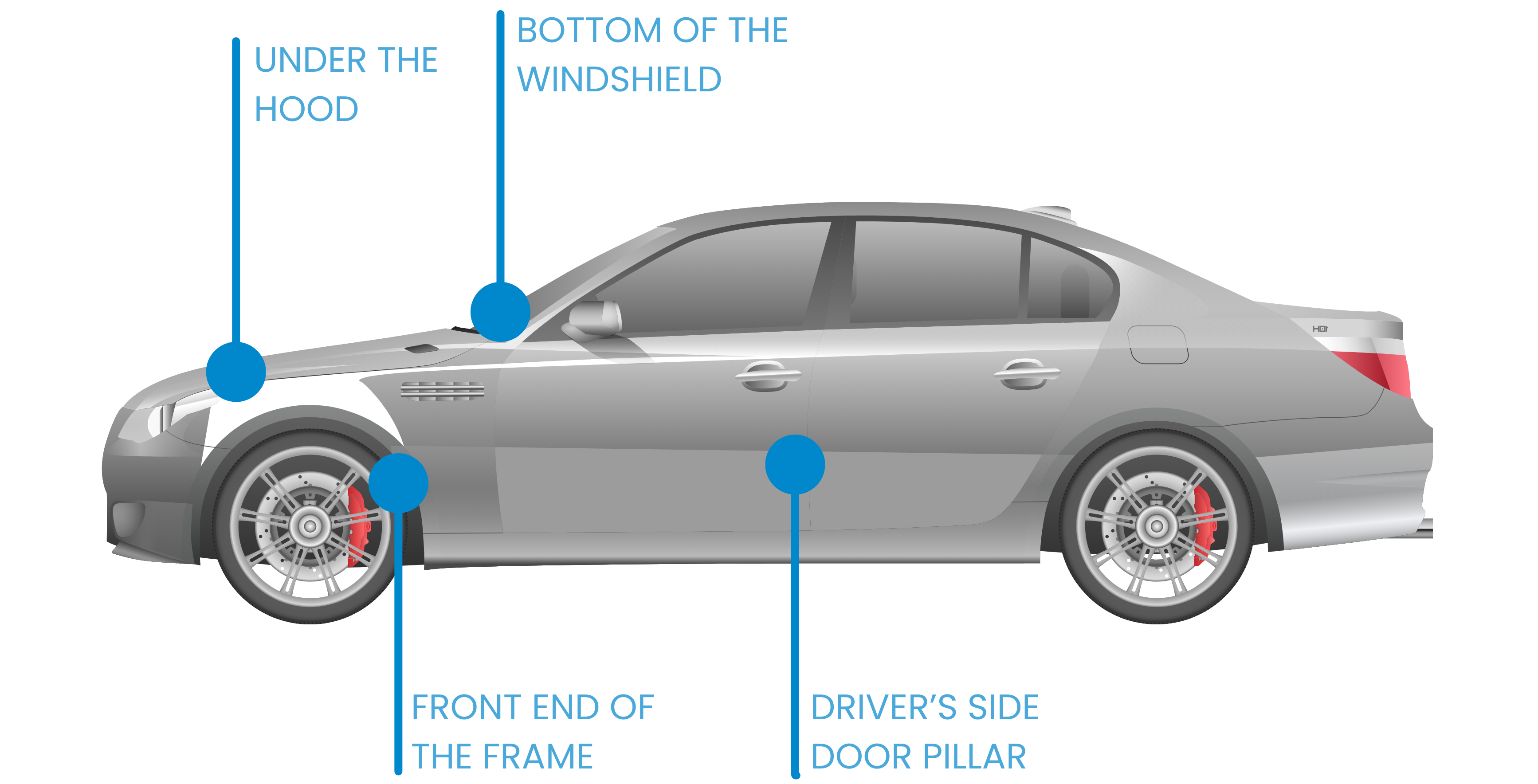
Scoring a great deal on a used car feels amazing! But what if it has a hidden recall? That could turn your dream ride into a serious safety risk. Thankfully, a check VIN number for recalls can help you avoid surprises. It also keeps your car safer than a locked vault full of grandma’s secret recipes.
In this guide, we’ll explain why recall checks matter, how to do them, and what to do if you find a problem.
Protect Your Investment – Run a Free VIN Recall Check Now!
Why Checking for Recalls Is Essential
Car recalls happen when a vehicle has a serious safety flaw or fails to meet federal standards. Although it might seem like a small issue, ignoring a recall can be dangerous. In some cases, it puts you, your passengers, and other drivers at risk.
Before buying a used car, always check number VIN for recalls. This step helps you avoid dangerous defects. Plus, it prevents unexpected repair costs that could drain your wallet later.
What Is a VIN and Where to Find It
Your VIN is like a car’s fingerprint—a unique 17-character code that contains important details. It tells you the make, model, year, and where the car was built. Since no two cars have the same VIN, it’s the best way to check for recalls.

Where to Check VIN Number For Recalls:
- Dashboard: Look through the windshield on the driver’s side.
- Driver’s Side Door Jamb: Open the door and check near the latch.
- Engine Bay: Often stamped on the engine block or near the radiator.
- Spare Tire Compartment: Hidden under the trunk lining in some models.
- Frame of the Vehicle: Older cars and trucks may have it stamped on the chassis.
Where to Find It in Documents:
- Vehicle Title & Registration – Your official ownership records.
- Insurance Card or Policy – Needed for claims or verification.
- Owner’s Manual – Some manufacturers print it inside.
- Window Sticker – The Monroney label on new cars.
- Service Records – Repair shops often note the VIN.
- Loan or Lease Documents – Essential for financing history.
How to Check VIN Number For Recalls
Doing a check VIN number for recalls is a straightforward process:
1. Find the VIN: Locate the 17-character VIN from the vehicle or documents (see preceding section for common VIN spots).
2. Visit a Reliable Recall Check Website: Head to a trusted platform like VinCheck.info to access a free VIN recall check.
Alternatively, you may also try to check recall from these official manufacturer pages:
- GM (Chevrolet, GMC, Cadillac, Buick) – GM.com
- Ford – Ford.com
- Toyota – Toyota.com
- Honda – Honda.com
- Nissan – NissanUSA.com
- Hyundai – HyundaiUSA.com
- Mazda – MazdaUSA.com
- Subaru – Subaru.com
- Volkswagen – VW.com
- BMW – BMWUSA.com
- Mercedes-Benz – MBUSA.com
- Chrysler (Stellantis) (Alfa Romeo, Chrysler, Dodge, Jeep, Ram, Fiat) – Mopar.com
- Kia – Kia.com
- Mitsubishi – MitsubishiCars.com
- Tesla – Tesla.com
- Jaguar Land Rover – JaguarUSA.com | LandRoverUSA.com
- Volvo – VolvoCars.com
- Porsche – Porsche.com
- Audi – AudiUSA.com
- Lexus – Lexus.com
- Acura – Acura.com
- Infiniti – InfinitiUSA.com
- Mini – MiniUSA.com
- Genesis – GenesisMotorsUSA.com
- Rivian – Rivian.com
- Polestar – Polestar.com
3. Enter the VIN: Type the VIN into the search field and hit search.
4. Review the Results: If any recalls exist, you’ll see details on the issue, possible risks, and the next steps.
Interpreting Recall Check Results
After you check VIN number for recalls, you’ll see one of these possible results:
- No Open Recalls – That’s great news! The car has no unresolved recalls, so past issues have already been fixed.
- Open Recalls Found – Some recalls still need repairs. If this happens, take these steps right away:
- Contact the Manufacturer or Dealer – First, reach out to confirm the details. Then, they will schedule any needed repairs, usually at no cost to you.
- Verify Repairs Before Buying – If you’re planning to buy the car, always check that all recalls have been fixed. Otherwise, you might deal with safety risks or unexpected repair costs later.
Steps to Take If a Recall Is Found
Finding a recall doesn’t mean you should walk away right away. Instead, follow these steps:
- Assess the Risk – First, determine if the issue is minor or a major safety concern. Understanding the risk helps.
- Talk to the Seller – Next, ask for proof that a certified technician fixed the problem. No proof? Be cautious.
- Check with a Dealership – Then, call a dealership to confirm if the recall repair was completed. If not, schedule one.
- Use It to Negotiate – If repairs aren’t done, request that the seller fix them before you buy. It may save you money.
- Consider the Future – Unfixed recalls can lower resale value later on. Always get records of completed repairs.
Benefits of Using VinCheck.info for Recall Checks
VinCheck.info offers a free, in-depth VIN recall check, giving you power to spot hidden safety issues before you buy. Stay ahead of potential risks and make smarter, safer car decisions—without spending a dime!
| Stay Updated on Recalls | Access the latest manufacturer and NHTSA recall alerts. |
| Ensure Vehicle Safety & Compliance | Verify that a car meets federal safety standards and is free of unresolved issues. |
| Make Smarter Buying Decisions | Perform a recall check by VIN before purchasing to avoid safety risks. |
| Identify & Fix Manufacturer Defects | Detect and resolve issues affecting performance and reliability. |
| Avoid Costly Repairs | Address recall fixes covered by the manufacturer at no charge. |
| Check for Recurring Recalls | Spot patterns of defects that impact longevity and safety. |
| Verify Recall Repairs | Ensure all recall-related fixes have been completed by previous owners or dealerships. |
| Boost Resale Value & Compliance | A recall-free vehicle is more marketable and avoids legal risks. |
| Quick Recall Lookup by VIN or License Plate | Instantly access recall details for any vehicle. |
Pro Tips for Buying a Used Car
After you check VIN number for recalls, these are other things you can do to buy smartly.
📑 Get a Vehicle History Report
Uncover hidden red flags like past accidents, title issues, and odometer rollbacks (check NMVTIS). This report reveals a car’s true past—before it becomes your future headache.
🔧 Bring in a Pro Mechanic
Even if the car looks perfect at first glance, hidden issues could still be a problem. That’s why bringing in a mechanic is a smart move. They can check for engine trouble, frame damage, or worn-out parts. Otherwise, you might end up paying for expensive repairs later.
⚠️ Research Reliability & Common Issues
Since not all cars are built to last, researching before buying is always a good idea. Start by reading reviews and checking service bulletins for potential red flags. Plus, owner forums often reveal common issues, frequent recalls, and costly repairs. This way, you can avoid cars with serious problems.
📈 Compare Market Prices
Avoid overpaying or falling for “too good to be true” deals. Use Kelley Blue Book, Edmunds, and NADA Guides to see what similar cars are actually selling for.
💲Factor in Total Ownership Costs
A car with a low sticker price might seem like a bargain, but other costs add up quickly. For example, insurance, fuel economy, maintenance, and repairs can make a big difference in long-term expenses. So, before making your final decision, compare these costs carefully to avoid surprises.
🚗 Take a Test Drive in Different Conditions
A car may feel great in a parking lot, yet handle poorly on other roads. To be sure, drive on highways, city streets, and rough roads while paying attention to braking, suspension, and engine noise. That way, you can spot potential issues before you buy.
💥 Spot Signs of Past Accidents
Don’t rely on the seller’s word—inspect for uneven paint, misaligned panels, or replaced parts. Check VIN number for recalls on body panels and look underneath for signs of frame repairs.
🗂️ Review Maintenance Records
A well-maintained car usually runs better and lasts longer. So, check for regular oil changes and major services. Look for timing belt replacements and other key repairs because they show the owner took good care of the car.
🤝 Negotiate with Confidence
Use the vehicle history report, mechanic’s inspection, and market research to support your price offer. If you find problems, ask for a discount or request repairs before buying. However, if the deal feels wrong, don’t be afraid to walk away.
🛡️ Verify the Seller’s Legitimacy
Car scams happen often, so be extra careful. First, read dealer reviews, then verify private sellers before paying. Also, avoid rushed payments, wire transfers, and sellers who refuse inspections because these are red flags.
🚦 Check Local Regulations
Every state has different rules for car registration, taxes, and emissions tests. Some states require extra paperwork for out-of-state purchases, so research these laws early to avoid surprises.
Key Takeaway
Shopping for a used car? Don’t let hidden issues catch you off guard! A recall check by VIN can uncover safety risks before they cost you big. Use trusted sites like VinCheck.info for free recall reports and stay ahead of potential problems. Just a few minutes of research could save you from expensive repairs and unwanted surprises.
Drive Smart, Drive Safe – Check VIN number for recalls now and hit the road worry-free!